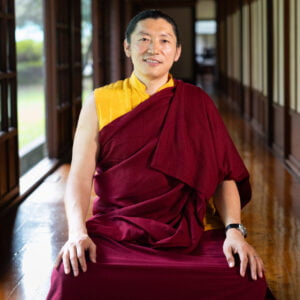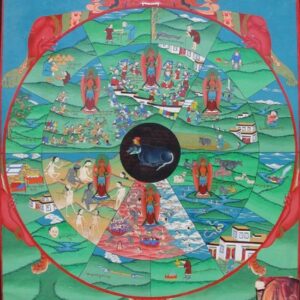Accumulating Causes: Advice for Practitioners
Accumulating causes for enlightenment might sound very confusing. Great masters remind us that there are no causes for Buddhas. Yet, we also learn that there are causes and conditions that lead to enlightenment. So how do we understand this apparent paradox?
In this video teaching, Phakchok Rinpoche reminds us that the essence of our mind is already enlightened. Vajrayana Buddhist teachers express this as the view, and understanding this view is fundamental to our practice. Yet, even though our nature is pure, that does not imply that we then can sit back and do nothing. Instead, Phakchok Rinpoche reminds us that in the Mahayana Samādhirāja Sūtra, the Buddha instructs us very precisely: we need to accumulate merit!
Accumulating Causes as Taught in the Samādhirāja Sūtra
In the Samādhirāja Sūtra, the Buddha teaches us to spend time accumulating causes for our enlightenment. These causes are known as the “two accumulations”: the accumulation of merit and the accumulation of wisdom. Furthermore, in the same text, the Buddha recounts that he personally spent countless eons making massive offerings to the buddhas.
Offerings
Rinpoche explains that his own meditation teacher, Nyoshul Khen Rinpoche, taught his students to make offering daily and to do confession practices. He instructed students to do feast offerings daily. So if we really want to follow the path of meditation authentically, we conscientiously accumulate merit. Normally, we think the accumulation of merit is based upon the practice of generosity. Generosity includes both making offerings to the buddhas and giving to the poor. As that is the case, we learn to do practice offerings on a daily basis. And we should not think that we’ve finished with offerings just because we’ve done 100,000 maṇḍala offerings during our four foundation practices. Of course, it is wonderful that we’ve done those offerings! We can rejoice, but then also continue the practice. Because the true purpose of these offerings is to reduce our attachment to things we like.
Confessing
Similarly, when we confess by practicing Vajrasattva, we are using the skillful means of Vajrayana methods. But we can find the original confession teaching in the Buddha’s own sūtra teaching. The Buddha himself taught that confessing was important. Moreover, the Buddha taught that it is especially powerful if we confess with four factors.
Four Factors
- Confessing to the object
- Having regret
- Pure motivation and focus
- Commitment not to repeat the mistake
Advice on Accumulating
Rinpoche advises students to keep practicing both offerings and confession. He suggests that we not think of accumulating just to reach certain numbers. Instead, we should accumulate in order to achieve results. Our accumulations should benefit our practice.
Self-Reflection
Rinpoche here speaks about two types of detachment. How do you understand that specific instruction?
When you engage in offering and confessing practices, how does that affect your meditation? And how does it affect your daily life experience?










Responses